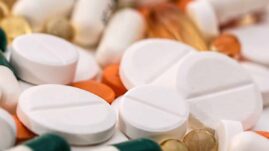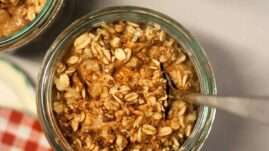There are so many pills, powders, bars, and drinks being marketed to people with diabetes today.
The problem, however, is that the majority of these products don’t have to be tested or proven effective through research before making it to market.
Unless it’s been approved by the U.S. Food and Drug Administration (FDA) and provided via prescription, there’s no guarantee that what you’re buying is effective in treating diabetes or that the product even contains the ingredients it claims to contain.
(To ensure the safest products, look for the United States Pharmacopeia [USP] symbol on the bottle, which means that the supplement has met the USP’s standards.)
In this article, we’ll look at some of the common dietary supplements that could potentially make an impact on your health as a person with diabetes, based on some preliminary (and ongoing) research.

10 supplements that could benefit people with diabetes
Remember, before spending money on any particular diabetes supplement product, the best things you can do for your health as a person with diabetes are to improve your diet by eating more whole foods, get physical activity every day, quit smoking if you smoke, and reduce your alcohol intake.
Research on many supplements, while promising, is so far inconclusive.
You should discuss any of these supplements with your healthcare team prior to taking them to ensure they will not negatively affect or interact with other health conditions or medications you’re taking.
Vitamin B-complex
For people taking metformin, a vitamin B-complex (and vitamin B12, specifically) is crucial. A 2016 study in The Journal of Clinical Endocrinology & Metabolism found that one potential side effect of the medicine is vitamin B12 deficiency.
(Newer research suggests this association with B12 deficiency is present when the metformin dose is at or above 1500 milligrams per day.)
A B12 deficiency can lead to B12 deficiency anemia. Left untreated, this can then result in irreversible nerve damage (neuropathy) that looks like it’s related to high blood sugar levels, when it’s in fact the result of the medication’s impact on B12 levels.
However, for people with diabetic kidney disease (nephropathy), high doses of a B-complex have been shown to rapidly decrease kidney filtration rate and increase cardiovascular events, such as heart attacks or strokes, according to a 2010 study from the Journal of the American Medical Association (JAMA).
This suggests that high doses of B vitamins may have negative effects on kidney function and cardiovascular health in people with diabetic nephropathy.
Additional studies are required to gain a clearer understanding of the impacts of vitamin B-complex on diabetes management.
Potential side effects and risks
For anyone, taking excessive amounts of B vitamins can lead to a variety of mild to dangerous symptoms, including diarrhea, sensitivity to light, skin rash, nausea, impaired liver function, and more.
Vitamin D
A 2019 study published by the European Journal of Endocrinology determined that people with a high risk of developing type 2 diabetes or those newly diagnosed could benefit from vitamin D supplementation.
Higher doses of vitamin D demonstrated moderate improvements in insulin sensitivity and beta-cell function (the cells in the pancreas that produce insulin) — which means study participants were more successful at producing their own insulin.
A 2023 review and meta-analysis (analysis of data from several studies) of randomized controlled trials published in the journal BMC Endocrine Disorders included a total of 46 trials with 2,164 participants and 2,149 placebo (inactive treatment) controls.
It found that vitamin D supplementation can be useful in reducing fasting plasma glucose, HbA1c (a measure of glucose control over the previous 2 to 3 months), and HOMA-IR (Homeostatic Model Assessment of Insulin Resistance, a measure of insulin resistance and beta-cell function) in people with type 2 diabetes, and particularly those who were deficient in vitamin D.
Low vitamin D levels have been associated with type 2 diabetes for years through research, but it has been difficult to pinpoint whether low levels contributed to the development of the condition or if they were a consequence of the condition.
More investigation is needed to understand the full scope of vitamin D’s impact.
Potential side effects and risks
Long-term use of large vitamin D doses can create an excess level of calcium in the blood (hypercalcemia) and can weaken your bones, cause kidney stones, and interfere with heart and brain function.
Berberine
One of the lesser-known supplements with the potential to help people with diabetes is berberine, explains a 2013 review of supplements published in Diabetes Spectrum, a journal of the American Diabetes Association.
“Berberine was compared to placebo in a 3-month study in 116 people with newly diagnosed type 2 diabetes and hyperlipidemia (high cholesterol or triglycerides).”
Compared to the placebo group, there was a significant decrease in A1c, fasting blood sugar, and after-meal blood sugar in participants who took 500 mg of berberine twice daily.
“A1C decreased from 7.5 to 6.6% in the berberine group and from 7.6 to 7.3% in the placebo group. There were also significant decreases favoring berberine in LDL cholesterol levels.”
In another randomized control trial cited in the 2013 supplement review, researchers compared the results of either berberine supplementation or metformin use in people newly diagnosed with type 2 diabetes.
Although the authors didn’t provide a statistical analysis, the numbers showed that berberine and metformin had similar effects. (Note that this finding is preliminary and should be interpreted with caution. Be sure to discuss any supplement use with a healthcare provider.)
A 2023 randomized, double-blind, placebo-controlled trial (the gold standard for research designs) published in BMC Endocrine Disorders evaluated the effectiveness of berberine in people with prediabetes.
In those who received 500 milligrams of berberine three times a day for 84 days, improvements were seen in fasting plasma glucose, fasting insulin, 2-hour oral glucose tolerance test results, and HbA1c levels compared to the placebo group.
Further exploration is necessary to understand the effects of berberine.
Potential side effects and risks
Berberine doses above 300 mg can lead to abdominal upset and constipation.
Christel Oerum, the founder of Diabetes Strong, took berberine for 14 days to test how it affected her type 1 diabetes. In this video, she talks about how it worked and why she had to stop taking it because of the side effects.
Cinnamon
Cinnamon can potentially help improve blood glucose control, according to some preliminary research. It’s thought that cinnamon might aid in diabetes management by helping to increase insulin sensitivity.
A 2011 meta-analysis published in the Journal of Medicinal Food suggested that cinnamon intake was linked to lower fasting blood sugar levels in people with type 2 diabetes or prediabetes.
A 2019 review also indicated that cinnamon supplementation might help decrease fasting blood sugar and insulin resistance in those with type 2 diabetes and prediabetes.
And a 2023 review suggested that cinnamon might be helpful as a supplement to standard diabetes treatment for reducing fasting blood glucose, HOMA-IR, and HbA1c in people with type 2 diabetes.
However, the studies included in the reviews evaluated different doses, treatment lengths, and types of participants. Results have been mixed, and further research is needed to understand cinnamon’s effects.
Potential side effects and risks
There are some risks linked with cinnamon consumption, particularly in large doses (over 1 teaspoon of Cassia cinnamon).
Cinnamon contains the compound coumarin (not to be confused with the blood thinner Coumadin), which can be harmful in large amounts and potentially cause liver damage.
Cassia cinnamon, the type most commonly found in supermarkets, has higher levels of coumarin than Ceylon cinnamon, so it’s important to consider the type and quantity if consuming cinnamon regularly for health purposes.
Cinnamon can also interact with certain medicines, including diabetes medicines, which could potentially lead to hypoglycemia (low blood glucose).
Mulberry
Mulberry may help those with diabetes by decreasing the absorption of carbohydrates in a meal, according to the previously mentioned 2013 review of supplements published by Diabetes Spectrum.
“Thus, mulberry may sometimes be used with a large meal to decrease postprandial [after-meal] glucose levels.” It may also help improve blood fat levels, according to the study.
Widely used in Asia by people with diabetes, mulberry leaf tea and extract have been compared to using a sulfonylurea diabetes drug (brand names Glucotrol, Amaryl, Diabeta, Glynase).
Additional research found it lowered glucose from 202 to 129 mg/dL, and A1c levels from 7.8 down to 7 percent.
Studies published in 2023 in Front Pharmacology, the Journal of Ethnopharmacology, and The American Journal of Chinese Medicine have also added to the body of evidence indicating that mulberry leaves may have blood-glucose-lowering and other properties that can help with diabetes management.
These studies are preliminary, and continued research is needed to fully understand the effects of mulberry.
Potential side effects and risks
Large doses of mulberry leaf or extract can lead to gastrointestinal upset and may interact negatively with several types of diabetes medications, causing hypoglycemia.
Chromium
“Chromium appears to act by enhancing or potentiating insulin’s actions” in people with type 2 diabetes, explains a 2001 review published by Diabetes Spectrum.
“Chromium’s actions have been attributed to an increase in the number of insulin receptors, increased binding of insulin to the insulin receptor, and increased activation of the insulin receptor in the presence of insulin.”
In short, a chromium supplement may increase the effectiveness of insulin and thereby improve blood sugar management.
Additionally, a 2023 meta-analysis published in Biological Trace Elemental Research, including 509 participants, indicated that chromium supplementation could reduce HbA1c levels to some extent in people with type 2 diabetes, but it did not appear to lower fasting blood glucose or blood lipid [fat] levels.
There is a need for more comprehensive studies to unravel the effects of chromium supplementation.
The best way to get more chromium is actually through whole foods like whole grains, cheese, dried beans, nuts, seeds, mushrooms, beef, wheat germ, and broccoli.
Potential side effects and risks
People who have kidney or liver disease may be at risk of harmful side effects from taking too much chromium.
According to isolated case reports, excessive consumption of chromium can lead to a variety of different health issues, including weight loss, anemia, thrombocytopenia (low blood platelet count), liver dysfunction, kidney failure, rhabdomyolysis (a rare but serious condition in which the muscles break down), skin inflammation, and hypoglycemia.
Turmeric (curcumin)
Complications from diabetes emerge not just as a result of high blood sugars, but also from inflammation.
In fact, a 2014 study published by the American Heart Association suggests that even in a high-glucose environment, cells in a person with diabetes may not be damaged unless inflammation is also present.
This means that anyone with diabetes could help protect themselves from developing complications by reducing inflammation.
Extracts from the spice turmeric (which contains a chemical compound called curcumin) are known for being a natural anti-inflammatory supplement, explains the aforementioned 2013 review of supplements published by Diabetes Spectrum.
Curcumin extract also works in other ways that may benefit blood sugar levels.
Researchers have found that curcumin extract may improve beta-cell function, reduce insulin resistance, and stimulate the secretion of the hormone glucagon-like peptide-1, which slows down the rate at which food is digested and increases how satisfied you feel after eating by signaling to your brain that you’re full.
Curcumin extract has also been studied for its potential to prevent the progression of prediabetes into type 2 diabetes, reports a 2012 study published by the American Diabetes Association.
People taking curcumin extract saw significantly improved beta-cell function, which means they were producing more insulin.
A meta-analysis of randomized controlled trials published in 2023 in the journal Diabetes & Metabolic Syndrome additionally found that turmeric/curcumin supplementation was linked to improvement in areas such as fasting blood sugar, fasting insulin levels, HbA1c, and HOMA-IR.
Potential side effects and risks
Large doses of turmeric or curcumin extract are mostly associated with abdominal upset and allergic dermatitis (a skin reaction).
If taken with drugs designed to prevent blood clots (like warfarin [Coumadin, Jantoven], aspirin, or clopidogrel [Plavix]), it can increase bleeding.
It may lead to hypoglycemia if it is taken along with diabetes medications and the person’s insulin sensitivity improves.
It’s also important to take turmeric with black pepper (piperine) to ensure the curcumin is properly absorbed
Stop taking turmeric/curcumin supplements at least 2 weeks prior to surgery because of the increased risk of bleeding.
Aloe vera
Aloe vera gel is one of the lesser-known supplements with potential results in people with diabetes, according to a 2009 review published by Diabetes Spectrum.
The review draws attention to a pair of older studies from 1996, published in Phytotherapy. These studies underscore the promising role of aloe gel, when consumed twice daily, in significantly reducing fasting glucose and triglyceride levels.
This was observed in people with both newly diagnosed and established type 2 diabetes, suggesting its potential use as a beneficial addition in diabetes management.
However, a more recent systematic review in 2022 concluded that while evidence suggests aloe vera may help with blood sugar management and blood lipid (fat) metabolism, scientific studies on this supplement are scarce.
Numerous factors limit the few available studies, making it challenging to determine an effective dosage and ensure long-term safety. Further studies are needed to provide a better understanding of aloe vera’s effects.
Potential side effects and risks
Taking aloe vera for more than a few days can affect your body’s electrolyte balance and act as a laxative, leading to dehydration.
It can also increase bleeding when used with general anesthetics during surgery, so it should be avoided 2 weeks prior to surgery.
ALA (alpha-lipoic acid)
Known for being a powerful antioxidant that also increases insulin sensitivity, ALA has shown the potential in some research to both treat and prevent diabetes, explains a 2009 review published by Diabetes Spectrum.
According to the review, ALA “has been proven to have a role in preventing beta-cell destruction and enhancing insulin sensitivity.”
However, it’s important to note that researchers determined that it’s only significantly effective at improving insulin sensitivity when it’s given intravenously (into your veins) versus orally.
Fortunately, its impact on beta-cell function and its antioxidant effects may still be beneficial when taken orally, though the impact of long-term supplementation is unclear.
The researchers concluded that it may be helpful in treating neuropathy, too, when taken at a dose of 600-1,800 mg daily.
“The antioxidant effects of [ALA] may also be helpful in slowing the development of diabetic neuropathy.”
That said, a 2019 analysis published in the Iranian Journal of Pharmaceutical Research suggests that ALA may not have a beneficial impact on diabetes-related markers such as HbA1c and cholesterol levels, so further studies are needed to determine how this supplement may impact diabetes management.
Additional research efforts are necessary to fully grasp the potential effects of ALA.
Potential side effects and risks
Taking more than 2,400 mg of ALA per day can result in nausea, rashes, and itching. There is no evidence supporting the consumption of doses higher than the recommended limit. Therefore, it is not advised even though it may not have harmful effects.
Vinegar
Vinegar (particularly organic, raw, and unfiltered apple cider vinegar) has become popular in the mainstream nutrition and health community. The previously referenced 2013 review of supplements published in Diabetes Spectrum supports that it may also directly benefit blood sugar levels in people with diabetes.
Two small independent studies cited in the review suggested that the consumption of approximately 2 teaspoons of vinegar with meals may significantly reduce after-meal blood sugar levels by around 20 percent.
In yet another small study cited in the 2013 review, people with type 2 diabetes who took vinegar at bedtime also demonstrated a notable reduction in fasting blood sugar levels the next morning.
The 2013 review states, “Vinegar may delay gastric [stomach] emptying, inhibit disaccharide activity, and promote muscle glucose uptake. It may also alter the glycolysis and hepatic gluconeogenesis cycle, which may benefit individuals who experience the ‘dawn phenomenon’ (an early-morning increase in glucose level).”
A review and meta-analysis of 9 randomized controlled trials published in 2021 in the journal BMC Complementary Medicine and Therapies suggests that the consumption of apple cider vinegar is linked to improvements in fasting glucose levels and blood lipid levels when taken for more than 8 weeks.
Ongoing scientific investigation is needed to uncover the effects of vinegar.
Potential side effects and risks
Vinegar should not be taken by people with esophageal or stomach issues such as ulcers, gastroesophageal reflux disease (GERD), irritable bowel syndrome (IBS), Crohn’s disease, or gastroparesis due to its high acidity content.
People who are on insulin or medications that stimulate insulin production and who consume vinegar run the risk of experiencing dangerously low levels of blood sugar or potassium.
Even people without these conditions or medications should limit their intake to 2 tablespoons (30 mL) per day because of the acidity content. Diluting it with water and drinking it through a straw can make it more tolerable and protect teeth from the acidity, too.
Final thoughts
If you are considering trying any of these supplements, it is critical that you discuss their use with your healthcare team before adding them to your regimen.
Certain pre-existing health conditions or medications could interact negatively with these supplements.
Additionally, most of the supplements discussed require further research to confirm their safety and effectiveness.
And note that even if some of these supplements are effective, none of them are in any way substitutes for regular diabetes medication (insulin, oral drugs, etc.). Never stop taking any diabetes medication without first consulting with your doctor.





Ivo
You should research GABA. Interesting effects and notable decrease in HbA1C for type 1